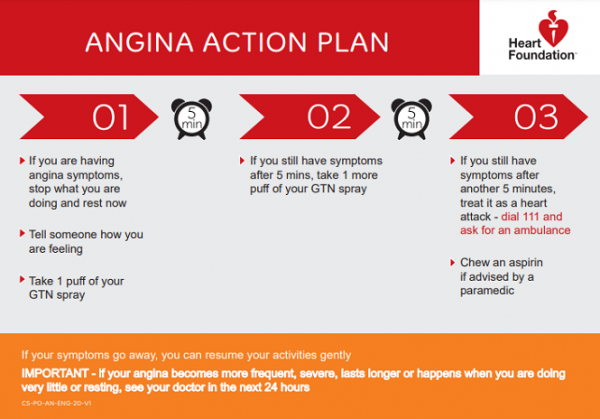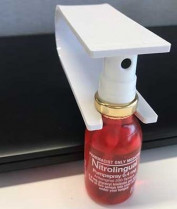Glyceryl trinitrate (spray)
Commonly called GTN spray
Key points about glyceryl trinitrate (spray)
- Glyceryl trinitrate (also called GTN) spray is used to relieve chest pain (angina).
- It is also called Glytrin®, Nitrolingual® or GTN spray.
- Find out how to use it safely and possible side effects.

GTN spray is used to relieve angina. Angina is chest pain which may spread to your throat, jaw, neck, shoulders or arms. Angina happens when the blood supply to the muscles of your heart are restricted, due to narrowing of the blood vessels supplying your heart.
GTN spray works by widening blood vessels, letting more blood and oxygen reach your heart. This reduces strain on your heart, making it easier for your heart to pump blood. Read more about angina.
GTN spray is sprayed under your tongue so that it starts having an effect immediately. In this way, it provides rapid relief from angina symptoms. It can also be used for when angina pain is expected to happen, such as before exercise that is likely to cause chest pain (eg, before climbing stairs).
In Aotearoa New Zealand, GTN spray is available on prescription from your doctor. You can also buy GTN spray from your pharmacy without a prescription, after consultation with your pharmacist.
If you experience chest pain (angina), chest ache or chest discomfort, take these steps:
- Stop what you are doing sit down and rest.
Tell someone how you are feeling.
Use 1 spray under your tongue and wait 5 minutes.
If your angina is relieved by rest or your spray, you can resume your activities gently. - If the pain is still present, use 1 more spray and wait 5 minutes.
- If the pain is still present, call 111 and ask for an ambulance.
Chew an aspirin if advised by a paramedic.

Image credit: Heart Foundation NZ
To avoid chest pain before doing some activities (like exercise), use 1 spray under your tongue 5–10 minutes before the activity.
The following instructions are to deliver 1 dose.
- If possible, sit down when using GTN spray.
- Remove the cap. Hold the canister upright with your forefinger on top of the white button. There is no need to shake the canister.
- Open your mouth and bring the spray nozzle as close as possible, aiming it under your tongue.
- Press the button firmly, directing the spray under your tongue while holding your breath.
- Keep the button held down until all the dose has been released. Close your mouth immediately but do not inhale the spray.
- Always replace the cap after use.
- You may feel a slight tingling in your mouth when you use GTN spray. This is harmless.
Nitrolingual pump handle
If you have problems using the spray because of difficulty with coordination or with your joints, eg, due to arthritis, you can use a nitrolingual pump handle(external link).
This plastic device is fitted onto the top of the GTN bottle and makes it much easier to squeeze down to release a spray of the medicine during an angina attack.
Other handy tips
- Keep your GTN spray with you at all times – make sure you always have your GTN spray with you so you know where it is when you need it. Don't hesitate to use it.
- Keep a spare GTN spray handy – make sure you get a new one before the old one runs out.
- Sit down before using GTN spray – it can make you feel light-headed and dizzy.
- Check the expiry date on the canister – after this date the spray may not work, so you will need to get a new spray.
- Storage – you can carry the spray in your pocket but it needs to be stored below 25ºC, so don't keep it in your car during summer.
Are you using medicines for erection problems?
|
Do not use GTN spray if you are taking medicines used to treat erection problems, such as:
Using erectile dysfunction medicine with GTN spray can cause a sudden decrease in blood pressure, which can be life threatening. |
|---|
- Are you pregnant or breastfeeding?
- Do you have low blood pressure?
- Have you recently had a heart attack?
If you have answered yes to any of these questions, it’s important that you tell your doctor or pharmacist before you use GTN spray. Sometimes a medicine isn’t suitable for a person with certain conditions, or it can only be used with extra care.
Like all medicines, GTN spray can cause side effects, although not everyone gets them. Often side effects improve as your body gets used to the new medicine.
| Side effects | What should I do? |
|---|---|
|
|
|
|
|
|
|
|
| Read more about medicines and side effects and reporting a reaction you think might be a side effect. | |
The following links have more information on GTN spray:
- Glyceryl trinitrate (spray) Patient Information(external link) (te reo Māori(external link)) NZ Formulary
- Heart Foundation Angina Action Plan in te reo Māori, Tongan, Samoan, Korean, Chinese and Hindi(external link)
References
- Glyceryl trinitrate (systemic)(external link) NZ Formulary
- Nitrolingual(external link) Medsafe NZ
- Viagra reminder: ask! don't be shy!(external link) Medsafe, 2001
Brochures

Medicines and side effects
Healthify He Puna Waiora, NZ, 2024

Health Quality and Safety Commission, NZ, 2019 English, te reo Māori
Credits: Sandra Ponen, Pharmacist, Healthify He Puna Waiora. Healthify is brought to you by Health Navigator Charitable Trust.
Reviewed by: Maya Patel, MPharm PGDipClinPharm, Auckland
Last reviewed:
Page last updated:





